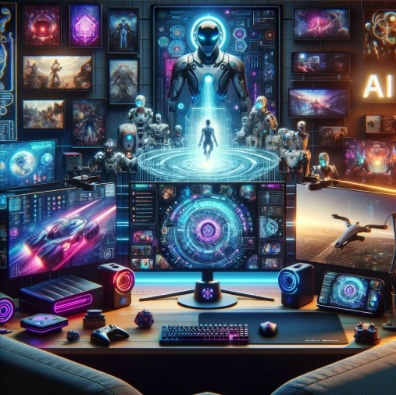Artificial intelligence (AI)) is upon us. But of course, unless you’re living in a cave, you know this. The news and corporate advertising campaigns are showing a relentless focus on the subject.
Due to this hyper focus, we’ve seen a lot of egregious and inaccurate uses for the term, “AI.” Every company wants to say “AI” because it’s a buzz word. And people are now using the term “AI” for nearly anything that’s halfway automated. This is largely the case in the gaming world.
Today, we’ll separate reality from fiction when it comes to AI in gaming.
AI in Gaming vs. Real-World Uses
The AI we hear about in the real world isn’t exactly the same as how AI is applied in gaming. And that’s the beginning of the confusion surrounding AI’s use cases in games.
Real-world AI involves the use of advanced technologies which allow machine learning and neural networks. These are systems which learn from vast amounts of data and improve over time. A popular AI system is ChatGPT. Another is Bard. Both of these applications are used by people to help improve their daily lives, or help run more involved, complex task for companies.
In gaming, AI typically involves are more scripted scenario. For example, AI may be pre-programmed into the design to provide an increased level of challenge. It is often rule-based and responds to players with predictable patterns.
The purpose of AI in gaming is primarily intended to boost the entertainment value of the game. AI in gaming should make the game more fun, harder, or more exciting.
AI in gaming is a restricted experience in a way given that AI technology requires endless resources that a game environment won’t have.
In the real-world, AI solves complex problems. That’s the big difference. Gaming AI is solely intended to boost the fun of the game.
AI in the real-world is a far more complex use case than in gaming.
Does AI Make Gaming More Realistic?
There’s nothing that sells a game more than its level of immersion. Given AR and VR are on the rise, and screen resolutions keep evolving, gamers are looking for more and more realistic experiences.
But do gaming developers leverage the power of AI to increase this immersive experience?
In games, the realism experience is distinctly tied to graphics and behavior. AI can contribute to behavioral realism by influencing how NPCs interact with players.
So an NPC is a “non-player character.” These are characters who aren’t controlled by the player.
In some games, AI can influence NPC behaviors in a way that makes them more believable. But again, AI in games is bound by the limited resources of the environment which limits how much of an influence it can have over an NPC’s behavior.
Another issue with AI and NPCs is that AI struggles to imitate authentic human behavior. So where an immersive experience depends on an NPC that exhibits human behavior, we might find limitations.
AI’s influence over video game realism must be kept in check. This is because too much realism in a game can take away from the challenging aspect of that game. There’s a balance that must be achieved.
Moreover, realism is a subjective experience, making it tough to “nail.”
Will AI Replace Human Players?
In a way, we buried the lead. Hey, we need the scrolls. Sorry.
There’s a common misconception paraded about the gaming world that AI will advance to a point where it takes over human roles in gaming. This is myth built up by mainstream media’s sensational AI coverage.
But it’s important to understand that humans bring unique, or, “human” qualities to the table that AI simply can’t mimic. Let’s break all that down.
Creativity and Imagination
Humans bring a level of creativity and imagination to gaming design and play that AI can’t replace. When we consider storytelling and artistic design, we’re just getting started. Sure, AI can assist in these areas, but it can’t take over.
AI can help bring new ideas to the table through increased brainstorming, or give new design ideas, but it can’t just run on auto-pilot.
Emotional Intelligence
Human developers and players possess emotional intelligence which is central to the creation of authentic storylines and characters. AI lacks this capacity for notable emotional intelligence attributes such as empathy.
Social Interaction
Gaming is fundamentally built around humans interacting and collaborating. Humans form massive gaming communities. AI can’t compete with this.
Conclusion
AI will undoubtedly become pervasive and influential in gaming, but it won’t take the helm from humans. While AI is great at assisting humans with storylines, character development, and graphic design, it can’t run on auto-pilot because all of those items require emotional intelligence, empathy, and creativity which AI lacks.
